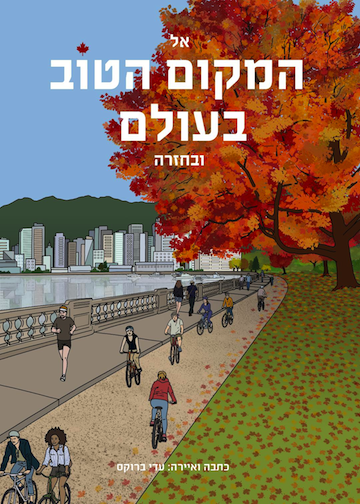הבירוקרטיה ממשיכה לנהל את החיים שלנו. הזכרתי בטורים הקודמים כי לאחר מותי אמי בחודש פברואר השנה , אחי בישראל ואני כאן בוונקובר, נדרשנו לטפל בצוואת ההורים, אך לאור הבירוקרטיה התהליך הפך למסובך ביותר
בנק הפועלים עיכב את שחרור הכסף מהחשבון של ההורים “רק” בחודשיים. לאחר מאבקים ממושכים הם העבירו לנו את הכסף כך שהצליחו לסיים את המשימה הראשונה
עתה אנו מנהלים מאבק קשה עם בנק לאומי בנוגע לחשבון נאמנות בו הופקדו הכספים ממכירת הדירה של ההורים. עורכי הדין של המשפחה לא עזרו מספיק והבנק החזיק ומחזיק בכספים ללא שום סיבה. הרוכש העביר כבר את מלוא הכספים עבור רכישת הדירה ואף קיבל את המפתחות לידיו. אנו לעומת זאת קיבלנו עד לרגע זה רק תשלום אחד מהחשבון, המוחזק בנאמנות על ידי משרד עורכי הדין שלנו ומשרד עורכי הדין של הרוכש. לאחר חודש של מאבק ממושך קיבלנו סוף סוף את התשלום הראשון. הורדו ממנו סכומים נכבדים ובהם הוצאות המיסוי שעבורי הן היו גבוהות מאוד, כיוון שאיני תושב ישראל. כן הורדו דמי התשלום עבור משרד עורכי הדין והעמלות עבור המתווכים
במהלך השבועיים האחרונים אנו מנהלים מאבק קשה בעורכי הדין שלנו כדי שיפעילו לחץ על הבנק לשחרר לנו את התשלום השני. בפועל הם הלקוחות של הבנק ולא אנו, כיוון שהם מחזיקים בו את חשבון הנאמנות. לאחר שמפתחות הדירה הועברו כבר אל הרוכש, אין שום סיבה בעולם עבור בנק לאומי להחזיק בכספים שלנו. להערכתי כל הסחבת הזאת מצד הבנקים השונים מאפשרת להם לעשות רווחים מהכספים שלנו שמוחזקים בחשבונותיהם. אחרת אי אפשר להסביר את הסיבה לעיכובים הארוכים שלהם
בסך הכל אנו אמורים לקבל עוד שני תשלומים מכספי הדירה המוחזקים בחשבון הנאמנות ואז סוף סוף הסתיים התהליך הארוך והבלתי הגיוני. אנו נמצאים כבר כשמונה חודשים לאחר מות אימי ואני מעריך כי נזדקק לעוד חודש נוסף לסיים את ענייני צוואה
אפשר לסכם את השנתיים האחרונות קשות מאוד עבור משפחתי ועבורי. לפני כשנתיים מצבו הבריאותי של אבי הידרדר לתהומות קשות עד שבראשית שנה שעברה לא הייתה ברירה, אלה לאשפז אותו בבית החולים איכילוב. שם הוא נדבק בקוביד וזה מה שהביא בסופו של דבר למותו. אבא נקבר בשבעה בפברואר אשתקד עת היה בגיל תשעים ואחד וארבעה חודשים. לאור מגפת הקוביד לא יכולתי לטוס לישראל ולהגיע להלוויה ונאלצתי לראות את הטקס הקשה הזה באמצעות זום. הוא נקבר בבית הקברות האזרחי של קיבוץ מעלה החמישה סמוך לירושלים
לאחר שבעים ואחת שנות נישואים אמא הפכה לאלמנה. היא התאוששה ממותו של אבי ונדמה היה שיש לה חיים טובים באופן יחסי. אמא התאמנה כמעט כל יום, קראה הרבה והיו לה לא מעט חברות. מצב בריאותה היתה טוב וחשבנו שהיא תוכל לחיות עוד מספר שנים טובות. אך זה לא קרה: בראשית חודש פברואר השנה היא נחנקה מחתיכת תפוח שהיה בסלט. היא איבדה מייד את ההכרה וכעשרים דקות לא הגיע חמצן למוחה. אמא הועברה במצב קשה ביותר לבית החולים איכילוב ולאחר ארבעה ימים נקבע מותה. כמו אבא היא נקברה בשבעה בפברואר בהפרש של שנה, גם כן בקיבוץ מעלה החמישה. אמא הייתה בת תשעים ושתיים על סף תשעים ושלוש. הפעם הצלחתי להגיע להלוויה, שקודם לכן הספקתי עוד לבקר אותה בבית החולים, עת הייתה מונשמת. אני גם הראשון שראה אותה כבר לא בחיים


